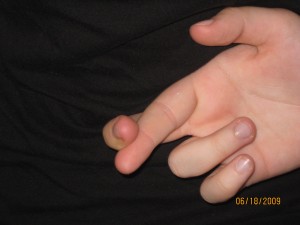Did you ever encounter a consistently helpful colleague who suddenly ceases cooperation? The person who seemed to happy help out now quietly refuses to assist as before. Perhaps the change came because the person feels unappreciated. But the resulting behavior is a good example of passive aggression.

One of the biggest discourtesies in the work world is passive aggression. In corrections, it can become unobtrusive sabotage that also infects others with the spirit of disunity. As we all know, our squabbles amongst ourselves become weak points for enterprising prisoners to exploit. In short, when we mistreat each other with passive aggression, we allow a possible break in security. Read more…
joebouchard Self Scrutiny, Staff relations, Training
Bullies are a problem in the work place. They coerce, manipulate and force others in order to further their agendas. Their presence in any worksite upsets the delicate balance of production and staff harmony. And in corrections, the danger is intensified. With so much safety at stake than a more traditional job, corrections staff need to assess the issue of bullies. Otherwise, the safety of staff, offenders, and the public is diminished.

I admit that it is a bit unorthodox, but I can imagine a wildlife documentary featuring bullies as the topic. Read more…
joebouchard Staff relations, Training
Sometimes when we make plans to improve elements of our institutional culture, we do so with high optimism. The sky is the limit in what may be achieved. However, our expectations may fall in mid-flight as the harsh truths of corrections charge in at us from the horizon. By surveying the landscape, we can battle our fear of flying.

There are seven vocational concepts that we should consider when we endeavor to improve the culture of our institution. Read more…
joebouchard Assessing the organization, Staff relations
Do horns and halos coexist on the same person? Can one be a devil and an angel at once? Can one operate in a consistent nature in dual modes? Is there a thin line between professionalism and jealousy? These questions can be answered by looking into the phenomenon of the Performance Bully.

Bullies hold sway over their victims through coercion. The most common type, the physical bully, threatens to administer pain. And most bullies of other varieties gain power over others through delivery of something unpleasant. However, there is an agent of intimidation who does the opposite. The threat is to withhold something from the target. This is a common tactic of the performance bully. Read more…
joebouchard Assessing the organization, Self Scrutiny, Staff relations
Many of us have observed division that originated from ineffective or malicious mentors. It is a topic about which I have been curious for some time. I believe that it a large and overlooked source of staff division in our vocation.

A few years ago, I presented “We don’t have to like each other. We just have to work together.” in Nashville at IACTP’s 21st Annual Trainers’ Conference. That long-titled program is essentially about recognizing and repairing staff division. Read more…
joebouchard Assessing the organization, Staff relations
About six years ago, I was contacted by a Deputy Warden who works in the same agency as I work. She asked me if I had any resources on bully control. As I am a librarian by trade, I did my best to meet her information needs. And I believe that those resources assisted in crafting an excellent training session.

That fueled some curiosity in me about the topic. Prior, I thought about bullies as existing in adult form. Certainly, the bully mentality is not outgrown and left on the playground. Professionals just happen to use more sophisticated versions of the behavior. And the issue of offenders who use intimidation came to mind, as well. Read more…
joebouchard Assessing the organization, Self Scrutiny, Staff relations
Decisions and pranks are similar: No two are exactly alike. Every practical joke has the potential to evoke many different reactions. Much of this is due to the multitude of circumstances.

Yet, mischief seems to be a part of our human condition. As playful incidents roll in with the undulating regularity of ocean waves, many questions arise. Are these jokes wholly bad? Do pranks have any benefits? How much is too much? Read more…
joebouchard Assessing the organization, Self Scrutiny, Staff relations, What the...?!?
I once heard something to the effect that with three people you have a clique and a potentially disenfranchised person. It doesn’t take much to create an exclusive group. Some groups believe that they are better than others. Unfortunately, it is a part of how human beings operate.
Many factions exist in our vocation. Perhaps clique is the most appropriate word for this. One could argue that the phrase subgroup is a reasonable substitution. There is an important distinction between clique and subgroup. Read more…
joebouchard Assessing the organization, Self Scrutiny, Staff relations
Is there simply one way to look at programming in correctional facilities?

“Why do you send expensive books to convicts?”
“Prisoners don’t learn anything from school.”
“They shouldn’t be paid for working.”
There are also many strong opinions about the many productive outlets provided by programming in corrections. Perhaps the most prevalent attitude from the anti-programs camp is “They’ve got nothing coming.” Read more…
joebouchard Assessing the organization, Staff relations
As sure as the sun will rise in the East, analysis and skepticism are two traits that become enhanced through experience in corrections. We learn to scrutinize as a matter of vocational survival.

With enough practice, we not only see the exposed tip of the iceberg; we can also visualize the huge bulk beneath the surface. Things are not always as they appear.
Unfortunately, not all mentors are what they appear to be. Sadly, we encounter ulterior motives and complex factors that place the mentee in hands of a bad mentor. Read more…
joebouchard Assessing the organization, Staff relations










